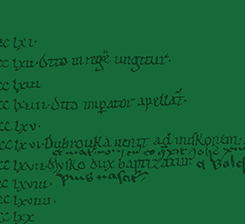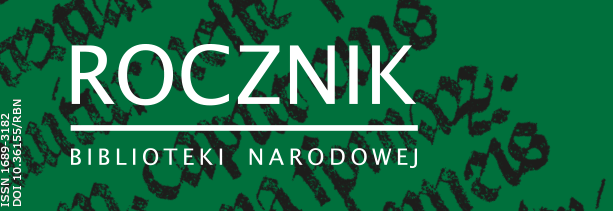NUMERY ARCHIWALNE

STRONA REDAKCYJNA, SPIS TREŚCI, s.1–8 / CREDITS, TABLE OF CONTENTS, 1–8
STUDIA I MATERIAŁY / STUDIES AND MATERIALS
Formy autobiograficzne a katalogowanie z wykorzystaniem Deskryptorów Biblioteki Narodowej, s. 11–20 / Autobiographical forms in cataloguing with the use of the National Library of Poland’s descriptors, p. 11–22
The paper presents problems related to cataloguing autobiography publications in the collections of the National Library of Poland. The author discusses classical literary genres of autobiographical literature (diary, memoir, autobiography, and journal), as well as cross-genres that combine literary fiction with autobiographical elements (autobiographical novels, short stories, novellas, and comic books). The application of terms and theses drawn from literary studies is supposed to facilitate the solution of specific problems encountered by active librarians.
Prawoznawstwo versus jurysprudencja. Nauki prawne w Deskryptorach Biblioteki Narodowej, s. 23–35 / Legal science in the National Library of Poland’s descriptors, p. 23–35
The article presents the changes in cataloguing legal science publications after the implementation of the National Library of Poland’s descriptors. In the first part, the author discusses the transformations of legal vocabulary from the National Library of Poland’s Subject Headings language to NLP’s descriptors. In the second part, changes in cataloguing legal publications are discussed, with particular emphasis on new bibliographic record fields related to legal science and on the principles of their creation, as well as interdependences between the descriptors in use and the faceted search.
Katalogowanie przedmiotowe publikacji z zakresu nauk biologicznych, rolniczych oraz medycznych z wykorzystaniem Deskryptorów Biblioteki Narodowej, s. 37–61 / Subject cataloguing of biological sciences, agriculture and medical publications with the use of the National Library of Poland’s descriptors, p. 37–61
Since the introduction of the National Library of Poland’s descriptors, the task of subject specialist librarians is not only to prepare formal and subject description of publications, but also to create new descriptors. Subject descriptions in natural and medical sciences, due to their character – continuous, rapid development of these disciplines and their terminology – requires the creation of numerous new descriptors. On the one hand, for some of the sciences (such as ecology or genetic engineering) a novel conceptual apparatus is invented, and on the other hand, descriptors need to be very precise so as to correspond with the specificity of particular documents. To start with, a librarian has to determine whether a new descriptor needs to be created at all, and if so, what form it should take to become unequivocally understandable and to match the existing network of references. The paper discusses the rationales for choosing descriptor names, as well as the creation of cross-references, and the structure of lower- and higher-level related and associated terms. The authors suggest solutions of certain problems, such as the representation of botanical and zoological taxonomy in the database, the creation of a classification of neoplasms, as well as a classification of human diseases versus animal and plant diseases. They also examine the application of thematic descriptors to biological sciences, agriculture and medical publications.
Nowe możliwości, nowe problemy – katalogowanie literatury dla dzieci przy użyciu Deskryptorów Biblioteki Narodowej, s. 63–81 / New opportunities, new problems: cataloguing children’s literature using the National Library of Poland’s descriptors, p. 63–81
This paper is an attempt to summarize the outcome of two years of cataloguing children’s and youth literature using the National Library of Poland’s descriptors. It presents new opportunities, as well as possible controversies that may be encountered by librarians cataloguing such publications. The authors discuss the problem of choosing subject and formal descriptors against the backdrop of contemporary studies in children’s literature, as well as the issue of difficulties underlying the selection of appropriate target groups. This paper may contribute to a further discussion about making such books available to readers and, in a wider perspective, also popularizing it.
Zadania bibliotekarza dziedzinowego przy tworzeniu deskryptorów przedmiotowych z chemii i nauk technicznych, s. 83–106 / The tasks of a subject specialist librarians in the creation of subject descriptors for chemistry and technical sciences, p. 83–106
The article presents every-day work of subject specialist librarians dealing with chemistry and technical sciences publications in the National Library of Poland, especially their work connected with subject descriptors. The authors analyze specific tasks and activities related to the creation and modification of subject descriptors, as well as the information flow between librarians, and between organizational units. They show examples of creating subject descriptors for the publications catalogued. Special attention is paid to case studies of the creation of particular new descriptors: the contributors analyze the circumstances in which the creation of a new descriptor is required, and the choice of its basic form, as well as particular cross-references. They also emphasize the need for using descriptor appositions and discuss examples of subject descriptors that are believed to require such appositions. The article examines the problem of creating interdisciplinary subject descriptors and the issue of differences in cataloguing publications from chosen disciplines.
Udostępnianie rękopisów i starodruków w Bibliotece Narodowej, s. 107–119 / Making manuscripts and early printed books available to readers at the National Library of Poland, p. 107–119
Making manuscripts and early printed books available to readers is a great challenge for the National Library of Poland, as it requires reconciling the preservation and conservation of the documents that are part of the National Library Resources for future generations with making it possible for users to study them. The article presents the approach of the National Library of Poland to these issues and describes the current rules of making manuscripts and early printed books accessible to users. It also discusses the sharing potential of the National Library of Poland’s websites – Polona and Academica – and present the information retrieval systems of the Reading Room of Manuscripts and Early Printed Books. The authors also compare the regulations in force at the National Library with those introduced in other libraries in Poland and abroad which make their special collections available to public.
Nieznany wolumin z dawnej biblioteki króla Zygmunta II Augusta w prywatnej kolekcji w Poznaniu, s. 121–126 / An unknown volume from the former library of King Sigismund II Augustus in a private collection in Poznań, p. 121–126
This communication introduces a volume, hitherto unmentioned in the literature on the subject, previously included in the former library of Sigismund II Augustus, King of Poland and Grand Duke of Lithuania, and now owned by Dr. Piotr Pokora from the Faculty of History, Adam Mickiewicz University, Poznań. The volume is composed of two printed books bound together (adligatum). The first of them (Divinae institutiones by Lactantius) was printed in 1539 in Antwerp, while the other one (Parabolae sive similia by Erasmus of Rotterdam) was published in 1522 in Hagenau. The binding of the volume is marked with the monarch’s supralibros.
Księgozbiór Karola Ferdynanda Wazy – przyczynek do rekonstrukcji, s. 127–162 / Book collection of Charles Ferdinand Vasa: a contribution to the reconstruction, p. 127–162
The library of prince Charles Ferdinand Vasa, son of the King of Poland and Sweden, bishop of Wrocław and Płock, was one of the richest libraries in Warsaw in the 17th century. After the demise of its owner, it became dispersed. In 1655 the collections were stolen by Swedish troops, transported to Sweden, and divided among public and private libraries. Thanks to the endeavours of King John III Sobieski, they were partly retrieved and added to the collection of the royal residence in Żółkiew. In 1740 the King’s inheritors passed the collection to Andrzej Stanisław Załuski, bishop of Cracow, and it was included in the Załuski Library. When Poland lost independence, the library was confiscated, transported to Russia and incorporated into the newly established Imperial Public Library in Sankt Petersburg (nowadays the National Library of Russia). The article describes hitherto unknown volumes preserved in this library and previously owned by prince Charles Ferdinand. It also lists volumes currently in the University of Warsaw Library that were not included Irena Komasara’s works. Bibliographic descriptions of particular items in the catalogue are supplemented with information about their previous proprietors to document their provenance from their first possessor till the last one.
Dwa latynoskie przekłady Konrada Wallenroda z XIX wieku, s. 163–185 / Two Latin-American translations of Konrad Wallenrod from the 19th century, p. 163–185
The article provides a comparison of two translations of Adam Mickiewicz’s Konrad Wallenrod: a Cuban and a Chilean one. The paper presents the profiles of the translators, the reasons why they undertook this task, and the probable original texts on which they based their translations. The Spanish-language versions of this verse novel are analyzed in order to determine the reception of these translations in their target cultural environment.
RECENZJE I SPRAWOZDANIA / REVIEWS AND REPORTS
Павел С. Рейфман, Цензура в дореволюционной, советской и постсоветской России, в двух томах, t. 1, выпуск 3, 1855–1917 гг., Москва 2017 [Paweł S. Rejfman, Cenzura w przedrewolucyjnej, sowieckiej i postsowieckiej Rosji, w dwóch tomach, t. 1, część 3, 1855–1917, Moskwa 2017], s. 189–194 / Review of: Павел С. Рейфман, Цензура в дореволюционной, советской и постсоветской России, в двух томах, t. 1, выпуск 3, 1855–1917 гг., Москва 2017, p. 189–194

